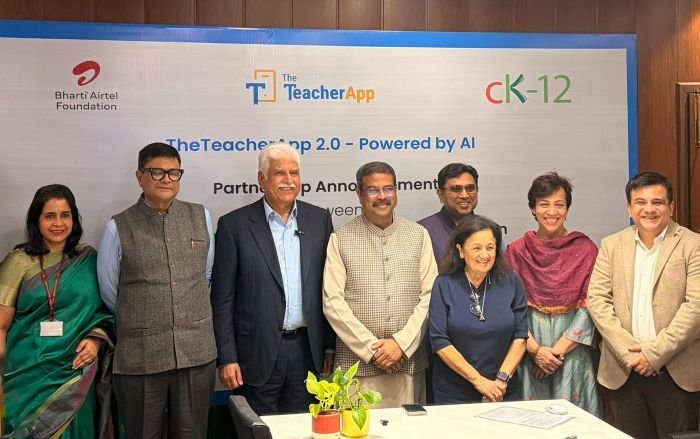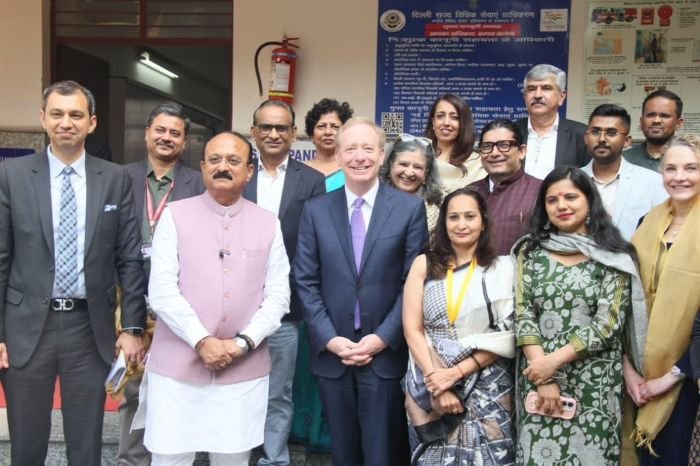
Support States to meet HR costs; structure CSR support to schools: Rakesh Kanwar, Edu Secy Himachal Pradesh
Union Minister of Education, Dharmendra Pradhan used the ARISE Annual School Education Conference 2024 platform on Dec 14 to warn private schools against abetting dummy schools saying that Government will do its own duty to close dummy schools. He said these schools are a grey area and needed to be weeded out. Parents have a choice of their school but private schools need to discourage coaching and help in curbing the ghost schooling practice. Members of ARISE can become benchmarks of good models for us to take them forward through our own agencies and central schools and then to states for implementation. “Your schools should be able to do away with the need of coaching,” he said and added that a social movement by private schools is needed against dummy schools.
Pradhan taking a leaf from the universal enrolment campaign launched during Vajpayee Government said there are 250 million children in now our school system and imagine the power of parents and societal impact of school education. “India needs to have global aspirations. We should have a board in the league of IB and CIE and CBSE has already been told about it. We can provide a role model for global south in primary education and also promote our soft power,” he said. Private schools can be strongest partners in NEP implementation model in building teacher capacity, pedagogical approaches and innovations. “We need to promote multilingual approach and should make thinking of our children global while also making them aware that we have four languages (Sanskrit, Tamil, Pali and Prakrit) that are more than 10,000 years old whose exploration is critical,’ he said.
Pradhan also mentioned that Government is preparing textbooks under new NCF for secondary classes with a view of global requirements not for just next 25 years but 50 years as it wants to lay emphasis on thought process of being a key player in 21st knowledge century. “Its germination has to happen in schools.” He also touched the debate of rote learning versus critical thinking and how skills are being made part of syllabus for the first time in the country. “There is a need for a balance between job creators and job seekers and to take the processes forward to the society.”
 At the same ARISE Annual School Education Conference 2024, held in partnership with the Federation of Indian Chambers of Commerce & Industry (FICCI) on 14th December 2024 in New Delhi, Himachal Pradesh’s Education Secretary Rakesh Kanwar, was a smash hit and won all applause from the audience for providing a reality check of declining learning levels in schools across India, much of which is a consequence of a make belief system created over years and now being remodelled by way of AI obsession and vendor driven system.
At the same ARISE Annual School Education Conference 2024, held in partnership with the Federation of Indian Chambers of Commerce & Industry (FICCI) on 14th December 2024 in New Delhi, Himachal Pradesh’s Education Secretary Rakesh Kanwar, was a smash hit and won all applause from the audience for providing a reality check of declining learning levels in schools across India, much of which is a consequence of a make belief system created over years and now being remodelled by way of AI obsession and vendor driven system.
Kanwar, while speaking at a session in presence of former Education Sectary of Govt of India, Anil Swarup, peeled the niceties of the system layer by layer showing their damage. He said, the schemes have placed emphasis on infrastructure but ignored teachers. “There is a need to support states to meet HR costs and not just the physical infrastructure of school education. There should be flexi pool in the annual plan. CSR fund support and collaborations are needed,” he added.
Talking about his state, which had universal enrolment even before the SSA was launched in 2002 and was seen among the top school education performers in the country and chosen for PISA in 2009 along with Tamil Nadu, in which India ended at bottom 72nd position among 74 participant countries, Kanwar said, the outcomes in the state have seen consistent decline (NAS result below national average and Performance Grading Index at 18th) besides a sharp decline in government schools.
He said, in a one-size fits all policy, for instance in focus on infra, our people were doing the same that say Bihar or other state was doing. The focus on Right to Education gave rise to unviable schools as schools expanded. Now the situation is there are schools but not enough students.
Telling about the compromised recruitment of teachers diluting teacher standards as all sorts of para teachers found their way in school education, Kanwar also spoke about the over reach of courts in these cases.
Talking about the compulsory training in a cascading model, HP education secretary, raised questions on it saying, “What is wrong with the training?” Why despite CCE, there is no retention? Why are learning levels declining? Most of it is ritual and not with the needs of individual teachers or schools they teach in. They are doing because it is compulsory not because they seek to improve their classroom situations. They don’t have freedom to decide on their training needs?
He also questioned teachers being made non-teaching work. The policies have turned teachers as ‘contractors’, SSA wallahs call shots over people on ground. There are too many events and celebrations every week that it kills teaching hours. Too much paperwork, teachers are always writing and submitting reports. Now the talk is of too much of drill down to find fault in teachers using technology in a renewed approach to put blame on teachers. AI smart solutions and vendor driven systems are posing threats to position of teachers. Effort is on to make teachers as assistants of filling forms. “We have lost our traditions of teacher-pupil dialogue as in Upanishads. Where will the focus on skilling lead us to?”
Kanwar’s observation of ‘Add Chapter Syndrome’ drew a standing ovation as it sounded so true because this has been a standard of policy makers replace the dialogue and burdening the system. He also talked about hierarchy of STEM downwards to art and theatre, lack of support staff despite buildings of crores. He added, dismantling of mental and physical barriers is needed for resource sharing along with rationalization of subjects is need of the hour as he confirmed his state is closing and merging unviable schools and is involving technical institutions and industry for job ready skills.
The conference
ARISE (Alliance for Re-imagining School Education), a grouping of several elite private schools in India and incubated as part of FICCI ecosystem and relaunched this March as a nonprofit platform focused on advancing K-12 education in India held a two-day annula conference on Dec 13-14 with the theme “The Learning Revolution – Breaking Boundaries, Building Futures,” the two-day conference brought together over 400 stakeholders, including government officials, educators, industry leaders, and innovators, to collaboratively address the pressing challenges and opportunities in the education sector.
The conference witnessed the participation of eminent speakers such as Rt Hon Nick Gibb, Former Minister of State for Schools, United Kingdom; Dr. Joseph Emanuel, Chief Executive & Secretary, Council for the Indian School Certification Examinations; Mr. D Ramakrishna Rao, President, Vidya Bharti Akhil Bharatiya, Shiksha Sansthan; Mr. Prakash Nair, Founding President & CEO, Education Design International; Mr. Richard Culatta, CEO, International Society for Technology in Education, Ms Ameeta Wattal, Chairperson &Executive Director, Education at the DLF Foundation Schools among others further enriching the conference with their illuminating perspectives.
The launch of the ARISE Principal’s Forum marked a significant milestone, providing School Principals and Academic leaders with a dedicated platform for professional development, peer collaboration, and access to tailored resources to enhance school management practices.
Thought provoking Panel discussions and interactive masterclasses held by Subject matter experts delved into preparedness for schooling in future, brought out divergent views and constructive debates around new-age teaching methodologies while staying focussed on the key beneficiary ie. the learner student for whom the importance of fostering creativity, adaptability, and lifelong learning was emphasised.
The conference also featured innovative modules such as Curated School tours showcasing best practices of impactful schools for replication, exclusive and personalised B2B exchanges with leading EdTech innovators, paving the way for transformative classroom solutions an exposition of the latest advancements in educational technology. These elements reinforced ARISE’s commitment to fostering innovation and driving excellence in the Indian education sector.
The conference concluded with a reaffirmation by ARISE to dedicate all energies & thought to advancing K-12 education by ensuring that recommendations and insights from the conference are collaboratively scrutinized with policymakers to influence the transformation of India’s school education sector to help prepare students to represent the country with pride when they step into the dynamic and ever evolving global stage in the years ahead.








